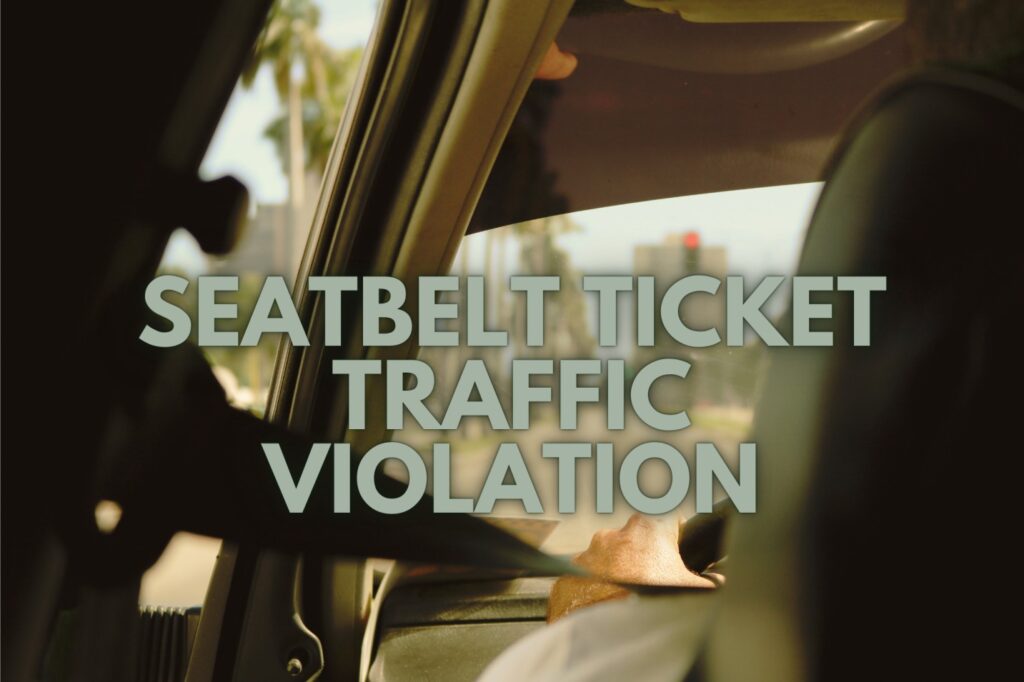Many drivers and passengers get seatbelt tickets, but many people don’t know if these tickets count as traffic violations. In most places, the answer is yes. A seatbelt ticket is a driving violation. This article explains what a seatbelt ticket is, how it affects your driving record, and why wearing a seatbelt is important.

Contents
What is a Seatbelt Ticket?
Seatbelt tickets are fines given to drivers or passengers who don’t wear their seatbelts while the car is moving. These laws, often called “click it or ticket,” help keep people safe and reduce injuries in accidents. Rules vary by state or country, but usually, everyone in the car must wear a seatbelt.
In many places, not wearing a seatbelt is a primary offense, meaning police can pull you over just for that. In other places, it’s a secondary offense, meaning you can only get a ticket if you’re already stopped for another violation, like speeding.
Is a Seatbelt Ticket a Traffic Violation?
Yes, a seatbelt ticket is a traffic violation. It’s not as serious as offenses like DUI or reckless driving, but it still breaks traffic laws. Traffic violations are usually divided into moving and non-moving violations. Seatbelt tickets are usually non-moving violations since they don’t involve how the car is driven, but this can vary depending on local laws.
What Happens if You Get a Seatbelt Ticket?
The consequences of receiving a seatbelt ticket can vary depending on where you live, but they often include the following:
- Fines: The main consequence of a seatbelt ticket is a fine. The amount can range from $25 to $200 or more, depending on local laws and whether it’s a first-time or repeat offense. If you get a ticket in New Jersey, you can pay it online using NJMCDirect, the state’s official traffic ticket website.
- Points on Your Driving Record: In some states, a seatbelt ticket can add points to your driving record. Too many points may increase your insurance rates or even lead to a suspended license.
- Impact on Insurance Rates: A single seatbelt ticket may not raise your insurance rates much, but multiple violations could. Insurance companies see frequent traffic tickets as a sign of risky driving.
- Court Appearances: In some cases, you may have to go to court, especially if you challenge the ticket or have multiple offenses.
- Secondary Offenses: If police in your area strictly enforce seatbelt laws, you might only get a ticket if you’re stopped for another reason. Still, it remains a traffic violation.
Why Do Seatbelt Laws Exist?
Seatbelt laws are based on research and data showing that seatbelts save lives. According to the National Highway Traffic Safety Administration (NHTSA), seatbelts saved 14,955 lives in 2017 alone. These laws exist for important reasons, including:
- Reducing Fatalities and Injuries: Wearing a seatbelt is one of the best ways to prevent death or serious injury in a crash. It keeps you securely in place, reducing the risk of being thrown from the car or hitting the interior.
- Protecting Vulnerable Road Users: Seatbelt laws often require children to use car seats or booster seats when riding with an adult. These measures are crucial for protecting young children, who are more vulnerable in accidents.
- Promoting Public Safety: Governments enforce seatbelt laws to encourage safe and responsible driving. This helps make the roads safer for everyone.
- Economic Benefits: Using seatbelts reduces injuries and deaths, which also lowers healthcare costs and eases the burden on emergency services.
Common Myths About Seatbelt Tickets
Despite the clear benefits of seatbelt laws, there are several myths and misconceptions surrounding seatbelt tickets:
- “I Don’t Need a Seatbelt for Short Trips”: Some people think seatbelts aren’t needed for short trips or low speeds, but most accidents happen near home. Even slow crashes can cause serious injuries.
- “Airbags Make Seatbelts Unnecessary”: Airbags are meant to work with seatbelts, not replace them. Without a seatbelt, an airbag’s force can cause more injuries instead of protecting you.
- “Seatbelt Tickets Are Just a Way for the Government to Make Money”: Seatbelt ticket fines do bring in government revenue, but the main goal of these laws is to save lives and prevent injuries.
How to Avoid a Seatbelt Ticket
Avoiding a seatbelt ticket is easy—always wear your seatbelt and make sure all passengers do too. Here are some extra tips:
- Set an Example: As a driver, wearing your seatbelt sets a positive example for your passengers.
- Educate Passengers: Make sure everyone in your vehicle understands the importance of seatbelt use.
- Check Local Laws: Familiarize yourself with the seatbelt laws in your area, especially if you are traveling to a different state or country.
Conclusion
A seatbelt ticket is a traffic violation. It may seem minor, but it has important legal and safety consequences. Along with fines and possible points on your record, seatbelt laws help protect lives and make roads safer. Understanding the risks of not wearing a seatbelt and the reasons behind these rules can help everyone stay safer. Remember, wearing a seatbelt isn’t just the law—it’s a simple action that can save your life.